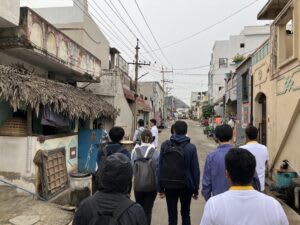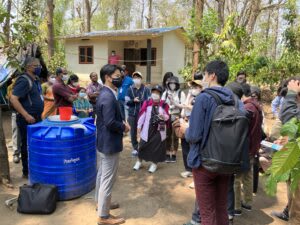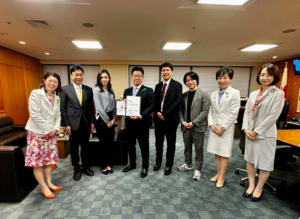Japan spent more than $19.6 billion on overseas development assistance (ODA) in 2023, making it the third largest single-country donor behind the US and Germany. Open Philanthropy’s Global Aid Policy (GAP) team, which is devoted to increasing government aid and guiding it toward more cost-effective approaches, believes there may be opportunities to increase the impact of this aid through targeted advocacy efforts. They estimate that in Western nations like the UK, for every $1,000 spent on ODA, aid advocacy funders spend around $2.60 attempting to support and inform its allocation. Meanwhile, in Japan, advocacy spending is a mere $0.25 for the same amount — more than 10 times less. Accordingly, the GAP program has prioritized work in Japan. The following case study highlights one grantee helping to drive this work forward.
*****
One day in March 2023, in the district of Wayanad near India’s southern tip, hundreds of villagers lined up for an uncommon service from an unexpected source: a check-up on their lung health, courtesy of Fujifilm. The Japanese company, best known for its cameras, was taking a different kind of picture. Its portable, 3.5 kg battery-powered X-ray machine, designed to deliver hospital-grade diagnostics, enables tuberculosis screenings in regions where medical facilities usually lack the necessary technology.
This scene was just one stop on an illuminating trip to India for a group of Japanese journalists and youth activists. From Toyota Tsusho’s Sakra World Hospital to Eisai’s efforts to combat neglected tropical diseases (NTDs) in Yarada village, each site visit highlighted Japanese businesses and researchers contributing to global health initiatives.

Recognizing this opportunity, Open Philanthropy supported Platinum, a Tokyo-based PR firm, in organizing a trip across India aimed at boosting the Japanese public’s awareness of urgent global health issues, particularly tuberculosis and neglected tropical diseases (NTDs). Sixteen people attended: six journalists, representing outlets ranging from a long-running daily newspaper to a popular economics broadcast, and 10 youth activists sourced from PoliPoli’s Reach Out Project, an Open Philanthropy-funded initiative that incubates charities focused on global health advocacy.
Our Senior Program Officer for Global Aid Policy, Norma Altshuler, thought the initiative was timely given recent trends in Japan’s ODA spending. Between 2019 and 2022, the share of Japanese ODA allocated to global health doubled (or tripled, including COVID-19 relief). To sustain this momentum, Open Philanthropy is supporting Japanese groups that aim to preserve or grow Japan’s commitment to prioritizing global health initiatives.
In a post-trip interview with Open Philanthropy, Soichi Murayama, who helped organize the trip, says one challenge of Japan’s media landscape “is that Japanese media doesn’t cover global health very often.” Murayama attributes the dearth of dedicated coverage to limited reader interest, creating a feedback loop where minimal reporting leads to low awareness, which in turn reduces appetite for such stories. Ryota Todoroki, a medical student who participated in the trip, echoes this sentiment: “NTDs are often seen as a foreign issue with no relevance to Japan, so changing this perception is a major challenge.”
The Fujifilm initiative in Wayanad provides an example of how connecting Japanese companies to global health efforts can help illustrate the impact of foreign aid. This approach not only highlights Japan’s technological contributions but also links economic interests with humanitarian efforts.

To gauge the impact of awareness campaigns, PR professionals often use metrics such as “earned media value” (EMV), which puts a price tag on organic media coverage by calculating the cost of equivalent paid exposure.
While EMV is an imperfect measure, our Global Aid Policy team viewed it as a useful proxy for gauging initial awareness, which could contribute to longer-term outcomes such as policy discussions and public engagement with global health issues. “Attributing change in the world back to this trip can feel nebulous”, explains Sam Anschell, a Program Associate on the team. “Feedback loops are going to be pretty noisy.”
Nonetheless, early results seem promising. The trip generated nearly $1.4 million in EMV — more than 10 times its cost. “We could tell the trip was going to create a couple of news articles,” Murayama says in a follow-up interview. “The surprise was that the actual return on exposure was many times more than what we had expected.”
Beyond the immediate media impact, our Global Aid Policy team sees encouraging signs of longer-term outcomes. After returning from India, medical student Todoroki founded NTDs Youth Organization, a nonprofit aimed at contributing to the elimination of neglected tropical diseases. In its first year, it has formed partnerships with the World Health Organisation and the Japanese Ministry of Health, Labour and Welfare, and has played a lead role in planning World NTD Day activities in Japan.

Todoroki credits the India trip with reigniting his passion for global health. “Ideally, many more people would see affected areas and meet patients suffering from tropical diseases firsthand,” he says. “But since that’s not feasible for everyone, it’s crucial for those of us who have witnessed it to share our experiences and stories.”

Nice story and this approach makes a lot of sense to me!